高一升高二衔接英语讲义1
- 格式:docx
- 大小:36.78 KB
- 文档页数:14
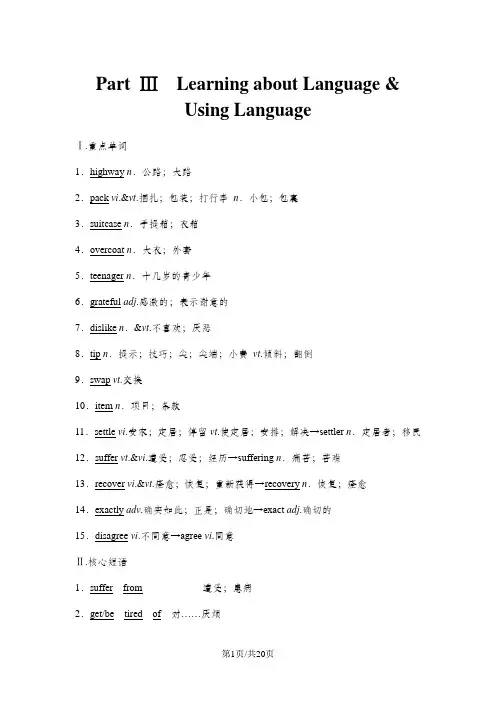
Part ⅢLearning about Language &Using LanguageⅠ.重点单词1.highway n.公路;大路2.pack vi.&vt.捆扎;包装;打行李n.小包;包裹3.suitcase n.手提箱;衣箱4.overcoat n.大衣;外套5.teenager n.十几岁的青少年6.grateful adj.感激的;表示谢意的7.dislike n.&vt.不喜欢;厌恶8.tip n.提示;技巧;尖;尖端;小费vt.倾斜;翻倒9.swap vt.交换10.item n.项目;条款11.settle vi.安家;定居;停留vt.使定居;安排;解决→settler n.定居者;移民12.suffer vt.&vi.遭受;忍受;经历→suffering n.痛苦;苦难13.recover vi.&vt.痊愈;恢复;重新获得→recovery n.恢复;痊愈14.exactly adv.确实如此;正是;确切地→exact adj.确切的15.disagree vi.不同意→agree vi.同意Ⅱ.核心短语1.suffer__from遭受;患病2.get/be__tired__of 对……厌烦3.pack__(sth)__up 将(东西)装箱打包4.take__no__notice__of 未注意到||,不理睬5.be__worried__about 担心6.get along with 与……相处;进展7.fall in love 相爱;爱上8.join in 参加;加入9.make friends 交朋友10.communicate with... 与……交流Ⅲ.经典句式1.Mother asked her if/whether she was very hot with__so__many__clothes__on.妈妈问她穿这么多衣服是否很热||。
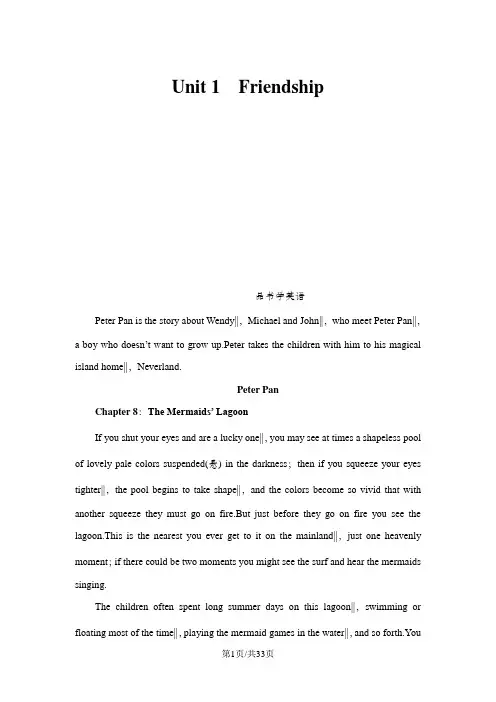
Unit 1Friendship品书学英语Peter Pan is the story about Wendy||,Michael and John||,who meet Peter Pan||,a boy who doesn’t want to grow up.Pete r takes the children with him to his magical island home||,Neverland.Peter PanChapter 8:The Mermaids’ LagoonIf you shut your eyes and are a lucky one||,you may see at times a shapeless pool of lovely pale colors suspended(悬) in the darkness;then if you squeeze your eyes tighter||,the pool begins to take shape||,and the colors become so vivid that with another squeeze they must go on fire.But just before they go on fire you see the lagoon.This is the nearest you ever get to it on the mainland||,just one heavenly moment;if there could be two moments you might see the surf and hear the mermaids singing.The children often spent long summer days on this lagoon||,swimming or floating most of the time||,playing the mermaid games in the water||,and so forth.Youmust not think from this that the mermaids were on friendly terms with them:on the contrary||,it was among Wendy’s lasting regrets that all the time she was on the island she never had a civil word from one of them.When she stole softly to the edge of the lagoon she might see them by the score||,especially on Marooners’ Rock||,where they loved to bask||,combing out their hair in a lazy way that quite irritated(激怒)her;or she might even swim||,on tiptoe as it were||,to within a yard of them||,but then they saw her and dived||,probably splashing(泼) her with their tails||,not by accident||,but intentionally.They treated all the boys in the same way||,except of course Peter||,who chatted with them on Marooners’ Rock by the hour||,and sat on their tails when they got cheeky.He gave Wendy one of their combs.The most haunting(令人难忘的)time at which to see them is at the turn of the moon||,when they utter(发出) strange wailing cries;but the lagoon is dangerous for mortals then.Wendy was often at the lagoon||,however||,on sunny days after rain||,when the mermaids come up in extraordinary numbers to play with their bubbles.The bubbles of many colors made in rainbow water they treat as balls||,hitting them gaily from one to another with their tails||,and trying to keep them in the rainbow till they burst.The goals are at each end of the rainbow||,and the keepers only are allowed to use their hands.Sometimes a dozen of these games will be going on in the lagoon at a time||,and it is quite a pretty sight.Ⅰ.Circle the correct answer.1.What do the mermaids play with?A.Balls. B.Bubbles. C.The moon. D.Rocks.2.Who do the mermaids talk to?A.Peter. B.Michael. C.Wendy. D.Everyone. 3.When do the mermaids utter wailing cries?A.At sunset. B.At midnight.C.At the turn of the moon. D.At sunrise.答案 1.B 2.A 3.CⅡ.Circle the correct meaning for each word.1.lagoonA.game B.waterfallC.a pond near the ocean D.desert island2.scoreA.large number B.sandy beachC.rocks D.rainbow3.baskA.swim B.talk quietlyC.eat fish D.lie in the sun答案 1.C 2.B 3.D导航知素养——A guide to the unitPart ⅠWarming Up & ReadingⅠ.重点单词1.dusk n.黄昏;傍晚2.loose adj.松的;松开的3.curtain n.窗帘;门帘;幕布4.thunder vi.打雷;雷鸣n.雷;雷声5.upset adj.心烦意乱的;不安的;不适的vt.使不安;使心烦6.calm vt.&vi.(使)平静;(使)镇定adj.平静的;镇静的;沉着的7.dusty adj.积满灰尘的→dust n.灰尘8.ignore vt.不理睬;忽视→ignorant adj.无知的;愚昧的9.outdoors adv.在户外;在野外→indoors adv.在户内;在室内10.entire adj.整个的;完全的;全部的→entirely adv.完全地;全然地;整个地11.power n.能力;力量;权力→powerful adj.强大的;强有力的→powerless adj.无力的;没有能力的;无权力的12.concern vt.(使)担忧;涉及;关系到n.担心;关注;(利害)关系→concerned adj.有关的;忧虑的→concerning prep.关于Ⅱ.核心短语1.add__up合计;加起来2.calm__(...)__down (使)平静下来;(使)镇定下来3.have__got__to 不得不;必须4.be__concerned__about 关心;挂念5.go__through 经历;经受6.set__down 记下;放下;登记7.a series of 一连串的;一系列;一套8.on purpose 故意9.in order to 为了……10.at dusk 在黄昏时刻11.face to face 面对面地12.no longer/not...any longer 不再……Ⅲ.经典句式1.While__walking the dog||,you were careless and it got loose and was hit by a car. 遛狗的时候||,你不小心把狗松开了||,它被车撞了||。
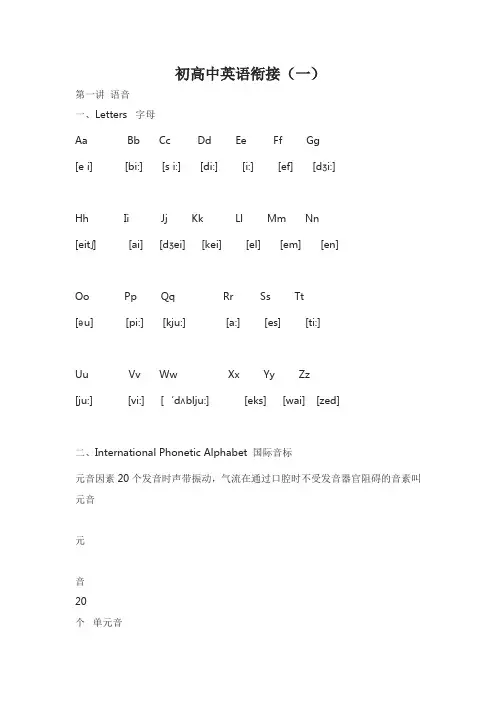
初高中英语衔接(一)第一讲语音一、Letters 字母Aa Bb Cc Dd Ee Ff Gg[e i] [bi:] [s i:] [di:] [i:] [ef] [dʒi:]Hh Ii Jj Kk Ll Mm Nn[eitʃ] [ai] [dʒei] [kei] [el] [em] [en]Oo Pp Qq Rr Ss Tt[əu] [pi:] [kju:] [a:] [es] [ti:]Uu Vv Ww Xx Yy Zz[ju:] [vi:] [‘dʌblju:] [eks] [wai] [zed]二、International Phonetic Alphabet 国际音标元音因素20个发音时声带振动,气流在通过口腔时不受发音器官阻碍的音素叫元音元音20个单元音(12个)前元音:[i:] [ i ] [e ] [æ]中元音:[ ə:] [ ə ] [ ʌ ]后元音:[ a: ] [ ɔ:] [ ɔ ] [u:] [u]双元音(8个) 合口双元音:[ei ] [ ai ] [ ɔi ] [ əu ] [ au ]集中双元音:[ iə ] [εə ] [ uə]辅音因素28个发音时气流在通过口腔时受到发音器官的阻碍而发出的音素叫辅音。
其中声带振动的叫浊辅音,声带不震动的叫清辅音轻辅音/p/ / t/ / k/ /f/ /θ/ /s/浊辅音/b/ /d/ /g/ /v/ /ð/ /z/轻辅音/ts/ /ʃ/ /tʃ/ /tr/ / h/浊辅音/dz/ /ʒ/ /dʒ/ /dr/ /r/鼻音/m/ /n/ /ŋ/半元音/w/ /j/ 舌边音/ǀ/语音的基本常识1、音节的划分一个单词的音标中有几个元音就有几个音节。
2、重读音节任何双音节或多音节单词的音标中,有重读音节和非重读音节,哪一个音节重读,该音节的左上方或该音节的元音上方标有重读符号“'”。
3、浊化音以sp__, st___, sk___开头的单词中,清辅音/p/ /t/ /k/分别要发浊辅音/b/ /d/ /g/。
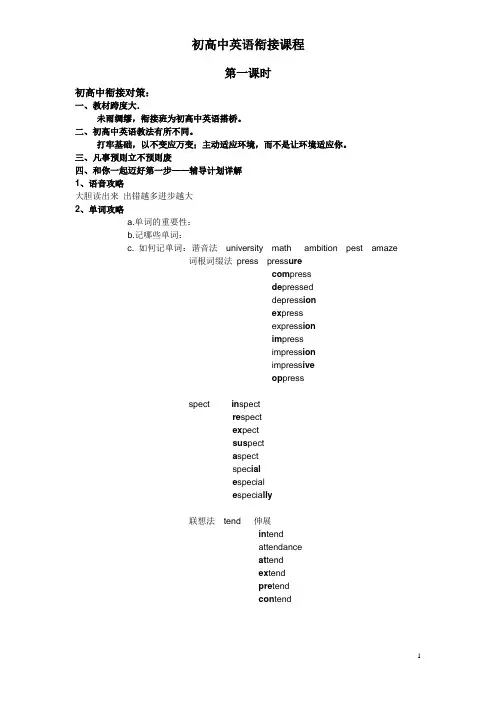
第一课时初高中衔接对策:一、教材跨度大.未雨绸缪,衔接班为初高中英语搭桥。
二、初高中英语教法有所不同。
打牢基础,以不变应万变;主动适应环境,而不是让环境适应你。
三、凡事预则立不预则废四、和你一起迈好第一步——辅导计划详解1、语音攻略大胆读出来出错越多进步越大2、单词攻略a.单词的重要性:b.记哪些单词:c. 如何记单词:谐音法university math ambition pest amaze词根词缀法press press urecom pressde presseddepress ionex pressexpress ionim pressimpress ionimpress iveop pressspect in spectre spectex pectsus pecta spectspec iale speciale specia lly联想法tend 伸展in tendattendanceat tendex tendpre tendcon tend3.语法攻略:从句4.阅读攻略:练习写出下列单词的汉语意思press urecom pressde presseddepress ionex pressexpress ionim pressimpress ionop pressimpress ivein spectre spectex pectsus pecte specia llyspec iale speciala spectin tendattendanceat tendex tendcon tendpre tend第二-三课时一、语法精讲第一讲对句子的认识基础知识还原1.十大词类名词----------表示人或事物的名称形容词-------表示人或事物的特征副词----------修饰动词、形容词、或其他副词动词----------表示动作或状态代词----------代替名词、数词数词----------表示数量或顺序冠词----------限制名词的意义介词-------表示名词、代词和其他词的关系连词-------连接词与词或句与句感叹词-----表示说话时的感情或语气一、按句子的结构可分三种:1)简单句:只有一个主语(或并列主语)和一个谓语(或并列谓语)。
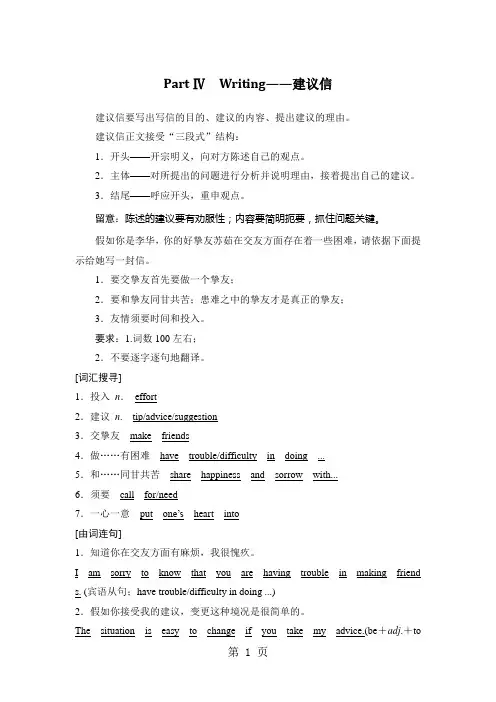
Part ⅣWriting——建议信建议信要写出写信的目的、建议的内容、提出建议的理由。
建议信正文接受“三段式”结构:1.开头——开宗明义,向对方陈述自己的观点。
2.主体——对所提出的问题进行分析并说明理由,接着提出自己的建议。
3.结尾——呼应开头,重申观点。
留意:陈述的建议要有劝服性;内容要简明扼要,抓住问题关键。
假如你是李华,你的好挚友苏茹在交友方面存在着一些困难,请依据下面提示给她写一封信。
1.要交挚友首先要做一个挚友;2.要和挚友同甘共苦;患难之中的挚友才是真正的挚友;3.友情须要时间和投入。
要求:1.词数100左右;2.不要逐字逐句地翻译。
[词汇搜寻]1.投入n.effort2.建议n. tip/advice/suggestion3.交挚友make__friends4.做……有困难have__trouble/difficulty__in__doing__...5.和……同甘共苦share__happiness__and__sorrow__with...6.须要call__for/need7.一心一意put__one’s__heart__into[由词连句]1.知道你在交友方面有麻烦,我很愧疚。
I__am__sorry__to__know__that__you__are__having__trouble__in__making__friend s. (宾语从句;have trouble/difficulty in doing ...)2.假如你接受我的建议,变更这种境况是很简单的。
The__situation__is__easy__to__change__if__you__take__my__advice.(be+adj.+todo)3.要交挚友首先要做一个挚友。
If__you__want__to__make__friends,__you__should__be__a__friend__first. (条件状语从句)4.你要和挚友同甘共苦。
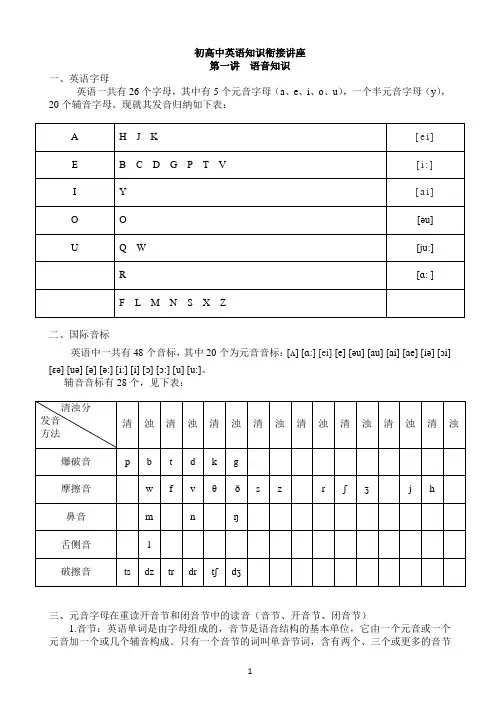
初高中英语知识衔接讲座第一讲语音知识一、英语字母英语一共有26个字母,其中有5个元音字母(a、e、i、o、u),一个半元音字母(y),20个辅音字母。
现就其发音归纳如下表:二、国际音标英语中一共有48个音标,其中20个为元音音标:[ʌ] [ɑ:] [ei] [e][əu] [au] [ai] [ae] [iə] [ɔi][ɛə] [uə] [ə] [ə:] [i:] [i] [ɔ] [ɔ:] [u] [u:]。
辅音音标有28个,见下表:三、元音字母在重读开音节和闭音节中的读音(音节、开音节、闭音节)1.音节:英语单词是由字母组成的,音节是语音结构的基本单位,它由一个元音或一个元音加一个或几个辅音构成。
只有一个音节的词叫单音节词,含有两个、三个或更多的音节的单词,分别称为双音节词和多音节词。
2.开音节:以一个元音字母结尾的重读音节称为开音节(或称绝对开音节)。
例如:be,no,hi,we,go,so等。
包含一个元音字母的重读音节中,在元音字母后面有一个辅音字母(r除外),还有一个不发音的字母e,这种重读音节也叫开音节(或称相对开音节)。
例如:name,time,bike,cake,nose等。
不论是绝对开音节还是相对开音节,其元音字母读它们本身的发音,即a [ei] e[i:] i[ai] o[əu] u[ju:]。
3.闭音节:包含一个元音字母,而以辅音字母(r,w除外)结尾的重读音节,称为闭音节。
例如:cap,desk,big,bus,hat等。
元音字母在重读闭音节中读它的短音,即a[ae] e[e] i[i] o[ɔ] u[ʌ]。
4.重读音节和非重读音节:只有一个音节的词都是重读音节,不标出重读符号。
在双音节或多音节词中,其中有一个需要读得较响亮的音节,这个音节就叫重读音节。
重读音节用―'‖符号表示。
例如:family['f aemili],table['teibl]。
重读音节之外的音节称为非重读音节。
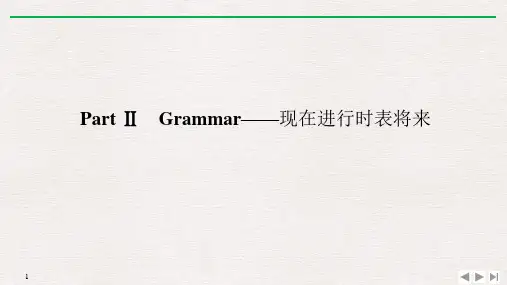
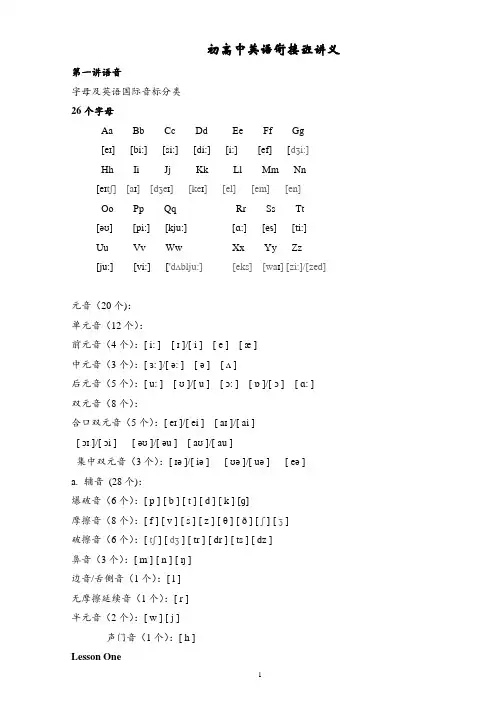
初高中英语衔接班讲义第一讲语音字母及英语国际音标分类26个字母Aa Bb Cc Dd Ee Ff Gg[eɪ] [bi:] [si:] [di:] [i:] [ef] [dʒi:]Hh Ii Jj Kk Ll Mm Nn[eɪtʃ] [aɪ] [dʒeɪ] [keɪ] [el] [em] [en]Oo Pp Qq Rr Ss Tt[əʊ] [pi:] [kju:] [ɑ:] [es] [ti:]Uu Vv Ww Xx Yy Zz[ju:] [vi:] ['dʌblju:] [eks] [waɪ] [zi:]/[zed]元音(20个):单元音(12个):前元音(4个):[ i: ][ɪ]/[ i ] [ e ][ æ ]中元音(3个):[ɜ: ]/[ ə: ] [ə][ʌ]后元音(5个):[ u: ][ʊ]/[ u ] [ɔ: ][ɒ]/[ ɔ ] [ɑ: ]双元音(8个):合口双元音(5个):[ eɪ]/[ ei ] [ aɪ]/[ ai ][ɔɪ]/[ ɔi ] [əʊ]/[ əu ] [ aʊ]/[ au ]集中双元音(3个):[ɪə]/[ iə ] [ʊə]/[ uə ] [ eə]a.辅音(28个):爆破音(6个):[ p ][ b ][ t ][ d ][ k ][ɡ]摩擦音(8个):[ f ][ v ][ s ][ z ][θ ][ ð][ʃ][ʒ]破擦音(6个):[tʃ][dʒ][ tr ][ dr ][ ts ][ dz ]鼻音(3个):[ m ][ n ][ŋ ]边音/舌侧音(1个):[ l ]无摩擦延续音(1个):[ r ]半元音(2个):[ w ][ j ]声门音(1个):[ h ]Lesson One[ p ][ b ][ t ][ d ][ i: ][ɪ]Step 1. Learn and read.[ p ]清音,双唇音,爆破音,送气,气流强。
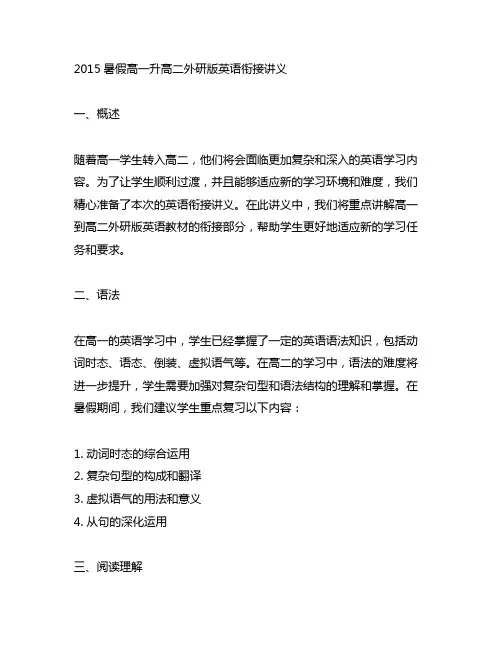
2015暑假高一升高二外研版英语衔接讲义一、概述随着高一学生转入高二,他们将会面临更加复杂和深入的英语学习内容。
为了让学生顺利过渡,并且能够适应新的学习环境和难度,我们精心准备了本次的英语衔接讲义。
在此讲义中,我们将重点讲解高一到高二外研版英语教材的衔接部分,帮助学生更好地适应新的学习任务和要求。
二、语法在高一的英语学习中,学生已经掌握了一定的英语语法知识,包括动词时态、语态、倒装、虚拟语气等。
在高二的学习中,语法的难度将进一步提升,学生需要加强对复杂句型和语法结构的理解和掌握。
在暑假期间,我们建议学生重点复习以下内容:1. 动词时态的综合运用2. 复杂句型的构成和翻译3. 虚拟语气的用法和意义4. 从句的深化运用三、阅读理解在高二的英语学习中,阅读理解将会占据更加重要的地位。
学生需要通过阅读各种类型的文章,提高自己的阅读理解能力,扩展自己的知识储备。
在这个暑假,我们建议学生多读一些外研版英语教材中的原版文章,针对不同类型的文章进行阅读训练。
学生也可以选择一些英语原版小说或者英语报刊杂志进行阅读,以提高自己的英语理解能力。
四、写作训练在高二的英语学习中,写作训练将变得更加重要。
学生需要通过写作训练,提高自己的表达能力和写作水平。
在这个暑假,我们建议学生着重进行以下写作训练:1. 书面表达的模板和范文学习2. 文章结构和逻辑的培养3. 词汇和语法的运用4. 语言表达的地道性和准确性五、听力和口语训练在高二的英语学习中,听力和口语训练也将占据更加重要的地位。
学生需要通过听力训练提高自己的听力理解能力,通过口语训练提高自己的口语表达能力。
在暑假期间,我们建议学生进行一些听力和口语训练:1. 听力材料的选取和训练2. 口语的模仿和演练3. 口语自我评价和提高六、总结通过本次的英语衔接讲义,我们希望学生能够在暑假期间有针对性地进行英语学习和训练,为高二的英语学习打下良好的基础。
我们也希望学生能够坚持不懈,始终保持对英语学习的热情和积极性,不断提高自己的英语综合能力。
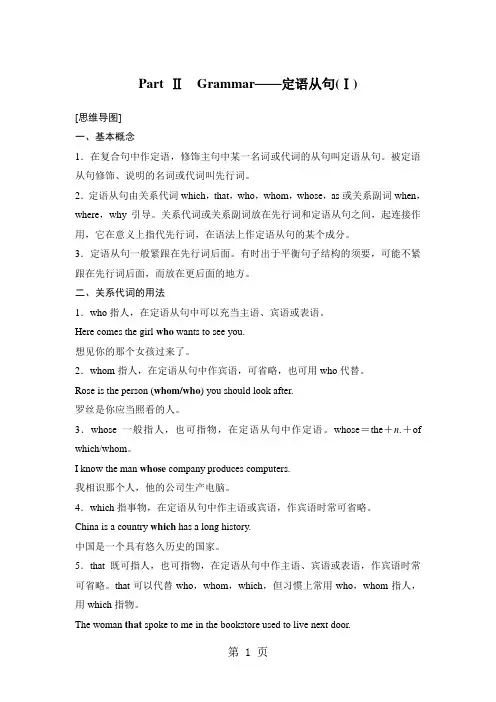
Part ⅡGrammar——定语从句(Ⅰ)[思维导图]一、基本概念1.在复合句中作定语,修饰主句中某一名词或代词的从句叫定语从句。
被定语从句修饰、说明的名词或代词叫先行词。
2.定语从句由关系代词which,that,who,whom,whose,as或关系副词when,where,why引导。
关系代词或关系副词放在先行词和定语从句之间,起连接作用,它在意义上指代先行词,在语法上作定语从句的某个成分。
3.定语从句一般紧跟在先行词后面。
有时出于平衡句子结构的须要,可能不紧跟在先行词后面,而放在更后面的地方。
二、关系代词的用法1.who指人,在定语从句中可以充当主语、宾语或表语。
Here comes the girl who wants to see you.想见你的那个女孩过来了。
2.whom指人,在定语从句中作宾语,可省略,也可用who代替。
Rose is the person (whom/who) you should look after.罗丝是你应当照看的人。
3.whose一般指人,也可指物,在定语从句中作定语。
whose=the+n.+of which/whom。
I know the man whose company produces computers.我相识那个人,他的公司生产电脑。
4.which指事物,在定语从句中作主语或宾语,作宾语时常可省略。
China is a country which has a long history.中国是一个具有悠久历史的国家。
5.that既可指人,也可指物,在定语从句中作主语、宾语或表语,作宾语时常可省略。
that可以代替who,whom,which,但习惯上常用who,whom指人,用which指物。
The woman that spoke to me in the bookstore used to live next door.在书店里跟我说话的那位妇女以前住在隔壁。
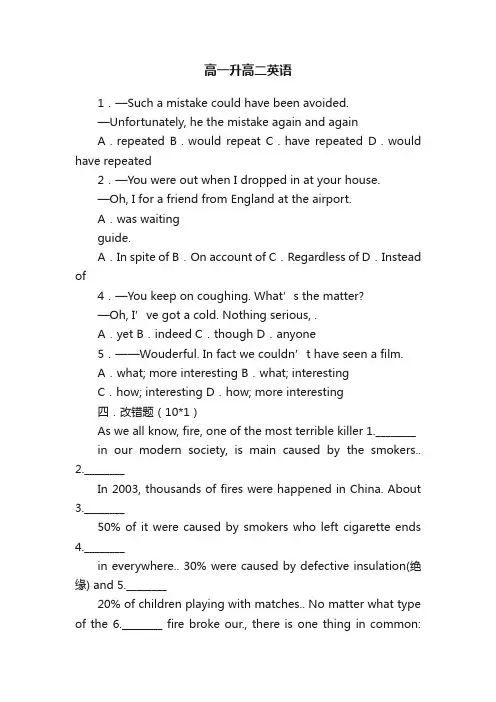
高一升高二英语1.—Such a mistake could have been avoided.—Unfortunately, he the mistake again and againA.repeated B.would repeat C.have repeated D.would have repeated2.—You were out when I dropped in at your house.—Oh, I for a friend from England at the airport.A.was waitingguide.A.In spite of B.On account of C.Regardless of D.Instead of4.—You keep on coughing. What’s the matter?—Oh, I’ve got a cold. Nothing serious, .A.yet B.indeed C.though D.anyone5.——Wouderful. In fact we couldn’t have seen a film.A.what; more interesting B.what; interestingC.how; interesting D.how; more interesting四.改错题(10*1)As we all know, fire, one of the most terrible killer 1.________ in our modern society, is main caused by the smokers..2.________In 2003, thousands of fires were happened in China. About 3.________50% of it were caused by smokers who left cigarette ends 4.________in everywhere.. 30% were caused by defective insulation(绝缘) and 5.________20% of children playing with matches.. No matter what type of the 6.________ fire broke our., there is one thing in common:Carelessness. 7.________ Therefore we should warn children with the dangers of playing 8.________ with matches. at a same time, workers should know the 9.________importance of good insulation to people’s lives. Of course.10._______B.had waited C.am waiting D.have waited 3.knowledge of the mountainous country, John Smith was appointed as our。
13三.专题过关1.Tom admitted the document in the morning without getting his managerA.readB.being readC.to readD.having read2.You ' ll find the hot issue that Da Vinci Furnitue Co., Ltd sold fraud furniture all over China.A. talk aboutB.to talk aboutC.talking aboutD. talked about3.What a fantastic view it is! We see millions of golden rape flowers, rows of houses and smokefrom behind them.A.roseB.to riseC.risingD.risen4. A disabled boy begging on the street was reported by a car, but the driver fled instead of sending him to hospital.A.being hitB.to be hitC.having been hitD.to have been hit5.One of the basic principles of wildlife protection involves adequate natural food and shelter to maintain populations of each species in a given environment.A. providedB. providingC. to provideD. provide6.Wearing shoes for the activity you are doing can help avoid some foot injuries to a large extent.A. designB. designingC. designedD. to design7.This scientist is known on this problem for about ten years.A. to workB. to be workingC. to have been workingD. to have been worked8.thoroughly, the garden looked more beautiful than ever before.9.Something as simple as thoughts openly can make a powerful difference to one ' s health.A. to shareB. sharingC. shareD. shared s permissionA. CleaningB. Having been cleanedC. Having it cleanedD. He had cleaned it510.The Internet gives people the chance to have the information to them quickly and cheaply.A. deliverB. deliveringC. deliveredD. to deliver11.The speech the minister made on TV the education reform made both teachers and students excited.A. being concernedB. to concernC. concernedD. concerning12.not to drive after drinking, some drivers are still trying their luck, which is really dangerous .A. Being remindedB. To remind C Having reminded D. Reminded13.Tony is a quiet boy and he is accustomed at meals, which is always appreciated.A. not to talkB. to not talkC. to not talkingD. not to talking14.wondering which way to take, the little boy behaved like a real gentleman who comforted his sister from time to time.A. LeavingB. Having leftC. To leaveD. Left15. Shanghai now increases the supply of smaller houses,to help low -income familiesto buy houses of their own.A. aimedB. being aimedC. aimingD. having aimed16People hope the new measures house prices, taken by the government, will succeed.A. to contr olB. controlledC. controllingD. having controlled17I stayed up late doing my homework yesterday, so I had trouble up early this morning.A. getB. gettingC. gotD. to get18. “ Have a nice day! ” is a wonderful expression,us, in effect, to enjoy moment and to value this very day.A. remindsB. to remindC. to be remindingD. reminding19. Seed plants - plants from seeds - need water, sunlight and mineral to grow vigorously.A. grownB. to growC. to be grownD. having grown20. It is the duty of a teacher the interest of students and pass on knowledge to them.A. to be stimulatingB. to have stimulatedC. to be stimulatedD. to stimulate21. Badly charities often give a portion of donations to their causes while spending the majority of money on salaries.7一.专题知识梳理非谓语动词解题步骤(有提示词)1)找逻辑主语一找非谓语动词的逻辑主语注意:找逻辑主语先要弄清楚非谓语所充当的成分A.充当定语一逻辑主语即为所修饰的名词或者代词1.A great number of students(question) said they were forced to practice the piano.2.Many buildings in the city need repairing, but the one(repair) first is the library.B.充当状语一逻辑主语是主句的主语1.(see) from the top of the tower, the south foot of the mountain is a sea of trees.2. It rained heavily in the south,(cause) serious flooding in several provinces.3.(complete) the project in time, the staff were working at weekends.C.充当宾补一逻辑主语是宾语2)判断关系一判断逻辑主语与非谓语动词之间的逻辑关系,主动还是被动,还是表示目的或者将来3)判断形式一判断非谓语动词的形式二.专题精讲★(一)不定式的形式:主动一般式to write进行式to be writing /完成式to have written否定式:not + (to)do被动to be writtento have been written★(二)动名词:动名词既具有动词的一些特征,又具有名词的句法功能。
高一升高二衔接英语讲义(1):一.课文知识点回顾(Book4)(1)重点单词单词回顾(根据提示写出相应的汉语意思或英语单词)1. n. 成就;功绩2.n. 项目;工程;规划3.n. 专家;专业工作者4. n. 组织;机构;团体5.vt. & vi. 举动;(举止或行为)表现6. n. 荫;阴凉处vt. 遮住光线7. vt. 观察;观测;遵守8. adj. 直言的;坦诚9.vt. & n. 尊敬;尊重;敬意10.vt. & vi. 讨论;辩论;争论11. vt. 鼓舞;激发;启示12.n. & vt. 支持;拥护13.n. 观众;听众;读者14.n. 突发事件;紧急情况15. n. 一代;一辈16.adj. 考虑周到的17.vt. 递送;生(小孩儿);接生;发表(演说等)18.adj. 谦虚的;谦让的;适度的19. vt. & vi. 斗争;拼搏;努力20.n. 十年;十年期21.adj. 特级的;超级的22.vt. & vi. 使变大;伸展23.n. 战役;战斗;较量;斗争24. adj.因为;所以;因而25. vt. & vi. 配备;装备26.vt. & vi. 输出;出口27.n. 工作;职业;占领28.vt. 使迷惑;使为难29. vt. 遗憾;惋惜n. 遗憾;懊悔30.adj. 化学的;关于化学的31.n. 矿物;矿石32.n. 土壤33.n. 根;根源34.vt. 浏览;略读35.vt. 画底线标出;强调36.n. 总结;摘要;概要37.n. 评论;议论vi. & vt. 表达意见;38.n. 幽默;滑稽39. 喜剧40.adj. 幸运的;吉利的41. adj. 平常的;普通的42.adj. 厌烦的43. prep. 遍及;贯穿adv. 到处44. n. 失败(者)45. vt. & vi. 战胜;克服46.vt. 使信服47. vt. & vi. 导演;指示;指挥adj. 直的;直率的48. n. 姿态;手势vi. 做手势49.adj. 特殊的;特别的50. n. 时刻;场合51.n. 解释;讲解;说明52. n. 耳语;低语vt. & vi. 低语;53.vi. 作出反应;回应54.adj. 醉的55. vi. & vt. 迎接;问候56. vt. 代表;象征57.n. 飞行;航班58.adj. 好奇的59.vt. & vi. 接近;靠近;走近n. 方法;途径60. n. 成人;成年人61.adj. 面部的62. n. 作用;功能;vi. 起作用;运转63.adj. 错误的;假的64.n. 等级;军衔65. n. 题目;主题(曲)66.adj. 中心的;中央的67.n. 旅游业68.adj. 独一无二的;仅有的69.n. 引擎;发动机70. vt. 保存;保留n. 保护区71. n. 长度;长72.n. 行动;事迹73.n. 少数;少数民族74.adj.高级的;先进的75.vt. 保护;保卫76. n. 皮革77.adj. 突出的;杰出的;显著的78.vt. 减少;减缩79.n. 商标;牌子80.vt. & vi. 循环;流传81.various adj.82.cartoon n.83.vast adj.84.nationality n.85.welfare n.86.freeway n87.souvenir n.88.tournament n.89.subjective adj.90.Spain n.91.dash vi.92.dormitory n.93.cheek n.94.budget n.95.moustache n.96.bacteria n.97.nutrition n.98.campaign n.99.intend vt.100.statistic n.(2)重点短语及句型练习A.课文经典句子回顾1.Suddenly it hit me how difficult it was for a woman to get medical training at thattime.2. Dr. Yuan Longping grows what is called super hybrid rice.3.Recently, however, scientists have been finding that long-term use of these fertilizers can cause damage to the land and, even more dangerous, to people’s health.4. Charlie first picks out the laces and eats them as if they were spaghetti.5. Unfortunately his father died, leaving the family even worse off, so Charlie spent his childhood looking after his sick mother and his brother.6. The first person to arrive was Tony Garcia from Colombia, closely followed by Julia Smith from Britain.7. However, people from places like Spain, Italy or South American countriesapproach others closely and are more likely to touch them.8. Whichever and whatever you like, there is a theme park for you.B.经典句型及短语练习1.他把一生都贡献在帮助残疾人事业上.He _________ all his life ________ _________the disabled people.2.这本字典是给小孩用的.(be intended to )The dictionary _______ ________ ________ children..3.努力改善这个工厂工人们的劳动条件是值得做的事_____ _______ ________to improve the working conditions for the workers of this factory.4.我突然意识到他是在向我求婚。
——————————————————————————————————————————————————— 1 DSE金牌英语专题系列专题系列第一讲开心一刻Section A 如何记忆英语单词1 熟悉音标,熟悉某些字母和字母组合的发音:48个国际音标表单元音:[i:] [ə:] [ɔ:] [u:] [a:] [æ][i] [ə] [ɔ] [u] [Λ] [e] 双元音:[ai] [ei] [ɔi] [i ə] [e ə] [u ə] [əu] [au][i:] meet [i] list [ə:] girl [ə] hurt [ɔ:] for [ɔ] hot [u:] who [u] foot [a :] far [Λ] cut [æ] bad [e] bed [ai] fly [ei] able [ɔi] boy [i ə] here [e ə] hair [u ə] tour [əu] hold [au] how 清辅音: [p] [t] [k] [f] [θ] [s] [∫] [tr] [t∫] [ts] [h] 浊辅音: [b] [d] [g] [v] [ð] [z] [ʒ] [dr] [d ʒ] [dz] [r] [l] [w] [j][m] [n] [ŋ][b] be [p] put [d] dog [t] tea [k] key [g] bag [f] far [v] give [m] map [n] win [l] lay [ŋ] hang [θ] thin [ð] with [s] sit [z] zoo [∫] fish [r] red [h] hit [tr] tree [dr] draw [ts] cats [dz] beds [ʒ] pleasure [t∫] rich [d ʒ] job [w] what [j] yes 2 相关诀窍 (1)借梯上楼法1. ban n. 禁令,禁止〔颁〈ban 〉布禁令〕2. die v. 死,死亡〔谍〈die 〉报工作危险,多是九死一生〕3. hang vi. 悬挂,吊着〔吊着嗓子,引吭〈hang 〉高歌〕4. pin n. 别针,针饰〔针饰是精品〈pin 〉〕5. song n. 歌曲,歌声〔送〈song 〉你一首歌〕(2)庖丁解牛法1. ache vi./n. 疼痛〔一(a)扯〈che 〉绷带,伤口就疼〕方老师在数学课上问阿细:“一半和十六分之八有何分别?”阿细没有回答。
↑
1.People who have the highest EQ are the most successful
↓
先行词(被修饰词)
2.定语从句的分析步骤: ⑴ 找出先行词
⑴ 分析先行词在从句中充当的成分
⑴ 对号入座选关系词
(二)、关系代词
(注意:根据学生的程度进行调整,看是否需要讲解关系代词as的用法,包括在限制性定语从句中和非限制性定语从句的用法)
(三)、关系副词
关系代词和关系副词的选用:
用法依据
根据从句谓语动词是及物动词,后面若无宾语,用关系代词,是
不及物动词则用关系副词
根据先行词在从句中作的成分把先行词放进定语从句中,若作主语或宾语用
关系代词,作状语则用关系副词
(四)、限制性定语从句和非限制性定语从句
根据定语从句与先行词关系的密切程度,定语从句可以分为限制性定语从句和非限制性定语从句,二者在用法和形式上的区别如下:
区分点限制性定语从句非限制性定语从句
限制程度不可或缺,去掉后对主句意思有
影响
补充说明主句,去掉后主句意思仍然完整
句子结构先行词与从句之间没有逗号先行词与从句之间有逗号分开翻译方式多译成前置定语多译成并列句
关系词的省略作宾语的关系代词可以省略任何关系词均不可省略,且不可
用that
先行词的不同先行词不可以是整个主句先行词可以是整个主句。
高一升高二衔接英语讲义(1):一. 课文知识点回顾(Book4)(1)重点单词单词回顾(根据提示写出相应的汉语意思或英语单词)1. n. 成就;功绩2. n. 项目;工程;规划3. n. 专家;专业工作者4. n. 组织;机构;团体5. vt. & vi. 举动;(举止或行为)表现6. n. 荫;阴凉处vt. 遮住光线7. vt. 观察;观测;遵守8. adj. 直言的;坦诚9. vt. & n. 尊敬;尊重;敬意10. vt. & vi. 讨论;辩论;争论11. vt. 鼓舞;激发;启示12. n. & vt. 支持;拥护13. n. 观众;听众;读者14. n. 突发事件;紧急情况15. n. 一代;一辈16. adj. 考虑周到的17. vt. 递送;生(小孩儿);接生;发表(演说等)18. adj. 谦虚的;谦让的;适度的19. vt. & vi. 斗争;拼搏;努力20. n. 十年;十年期21. adj. 特级的;超级的22. vt. & vi. 使变大;伸展23. n. 战役;战斗;较量;斗争24. adj.因为;所以;因而25. vt. & vi. 配备;装备26. vt. & vi. 输出;出口27. n. 工作;职业;占领28. vt. 使迷惑;使为难29. vt. 遗憾;惋惜n. 遗憾;懊悔30. adj. 化学的;关于化学的31. n. 矿物;矿石32. n. 土壤33. n. 根;根源34. vt. 浏览;略读35. vt. 画底线标出;强调36. n. 总结;摘要;概要37. n. 评论;议论vi. & vt. 表达意见;38. n. 幽默;滑稽39. 喜剧40. adj. 幸运的;吉利的41. adj. 平常的;普通的42. adj. 厌烦的43. prep. 遍及;贯穿adv. 到处44. n. 失败(者)45. vt. & vi. 战胜;克服46. vt. 使信服47. vt. & vi. 导演;指示;指挥adj. 直的;直率的48. n. 姿态;手势vi. 做手势49. adj. 特殊的;特别的50. n. 时刻;场合51. n. 解释;讲解;说明52. n. 耳语;低语vt. & vi. 低语;53. vi. 作出反应;回应54. adj. 醉的55. vi. & vt. 迎接;问候56. vt. 代表;象征57. n. 飞行;航班58. adj. 好奇的59. vt. & vi. 接近;靠近;走近n. 方法;途径60. n. 成人;成年人61. adj. 面部的62. n. 作用;功能;vi. 起作用;运转63. adj. 错误的;假的64. n. 等级;军衔65. n. 题目;主题(曲)66. adj. 中心的;中央的67. n. 旅游业68. adj. 独一无二的;仅有的69. n. 引擎;发动机70. vt. 保存;保留n. 保护区71. n. 长度;长72. n. 行动;事迹73. n. 少数;少数民族74. adj.高级的;先进的75. vt. 保护;保卫76. n. 皮革77. adj. 突出的;杰出的;显著的78. vt. 减少;减缩79. n. 商标;牌子80. vt. & vi. 循环;流传81. various adj.82. cartoon n.83. vast adj.84. nationality n.85. welfare n.86. freeway n87. souvenir n.88. tournament n.89. subjective adj.90.Spain n.91. dash vi.92. dormitory n.93. cheek n.94. budget n.95. moustache n.96. bacteria n.97. nutrition n.98. campaign n.99.intend vt.100.statistic n.(2)重点短语及句型练习A. 课文经典句子回顾1. Suddenly it hit me how difficult it was for a woman to get medical training at thattime.2. Dr. Yuan Longping grows what is called super hybrid rice.3.Recently, however, scientists have been finding that long-term use of these fertilizers can cause damage to the land and, even more dangerous, to peo'sp le health.4. Charlie first picks out the laces and eats them as if they were spaghetti.5. Unfortunately his father died, leaving the family even worse off, so Charlie spenthis childhood looking after his sick mother and his brother.6. The first person to arrive was Tony Garcia from Colombia, closely followed by JuliaSmith from Britain.7. However, people from places like Spain, Italy or South American countries approach others closely and are more likely to touch them.8. Whichever and whatever you like, there is a theme park for you.B. 经典句型及短语练习1. 他把一生都贡献在帮助残疾人事业上.He ________ all his life _______ __________ the disabled people.2. 这本字典是给小孩用的.(be intended to )The dictionary ______ _________ ________ children..3.努力改善这个工厂工人们的劳动条件是值得做的事____ _______ __________ to improve the working conditions for the workers of this factory.4. 我突然意识到他是在向我求婚。
Suddenly it _____ ____ ____ he was trying to ask me to marry him.5. Jane宁愿呆在家里也不愿参加那样的聚会。
Jane ____ _____ stay at home than go to such parties.6. 校长对我的教学工作很满意The headmaster ______ ____________ ________ my teaching work.7. 山西省盛产煤矿Shanxi Province ___ ______ _____ coal.8..摆脱一种坏习惯不是件易事。
It is hard to _________ a bad habit.9. 她挑出了和衣服搭配的鞋子She ____ _____ the shoes that matched the dress.10. 她从报纸中裁剪下了照片并将其粘到文件夹中She __ _____ the photo from the newspaper and glued it to her folder.11. 他们没有交电费,因此电源被切断了They had their electricity _____ ____________ because they didn ' t pay the bill. 12. 我们再也不能缩减开支了We can ' t _____ _________ our expenses any further.13. 灰松鼠是由北美传人英国的.The grey squirrel ___ ____ ____ Britain from North America.14. 为了避免被车撞上,他不得不来个急转弯。
_____ avoid _____ ______ by the car, he had to make a sharp turn.15 我的同学并不都是团员。
_____ _____ my classmates are league members.16 由于不知道她的电话号码,我们无法跟她取得联系。
_____ _____ her telephone number, we couldn ' t get in touch with her.17. 这个小男孩通过玩在线游戏娱乐The boy ___________ ______________ by playing games online on Sundays.18. 当地政府给公园提供的许多运动器材。
The local government _____ the park ___ a lot of sports facilities.19. 与其说他笨,倒不如说他懒。
He is ______ lazy _____ stupid.20. 他是一个有经验的教师。
He ________ ______________ __________ teaching答案:1.devoted, to help2.is intended for3.It is worthwhile to4.hit me that5.would rather6. felt /was satisfied with7 is rich in 8. get rid of9 picked out10. cut out11.cut off 12.cut down13. was introduced into 14. To being hit15. Not all 16. Not knowing17. amused himself 18.provided ---with 19.more ...than 20.is experienced in/at语法回顾 ---句子成分及句子类型什么叫句子成分呢?句子的组成成分叫句子成分。